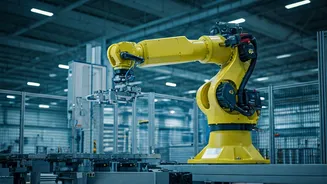The Automation Revolution
The arrival of robots and automation has ignited a crucial discussion about the future of work. Across diverse industries, machines are now taking over
tasks that were once handled exclusively by humans. This shift is not merely about replacing manual labor; increasingly, artificial intelligence and sophisticated algorithms are also performing complex cognitive functions. The implications of this automation revolution are wide-ranging, raising questions about job displacement, the need for new skills, and the very nature of work itself. Industries like manufacturing, transportation, and customer service have already seen significant transformations, with robots and AI handling tasks from assembly line operations to data analysis and customer interactions. These advancements bring both opportunities and challenges, requiring individuals and societies to adapt to a rapidly changing economic environment. The speed at which these changes are occurring necessitates proactive measures, including reskilling programs, new education models, and policy adjustments to ensure a fair and equitable transition for all.
Job Displacement Concerns
One of the most pressing concerns surrounding the growth of automation is the potential for job displacement. As robots and AI become more capable, they can perform tasks previously done by human workers, leading to job losses in certain sectors. The impact is not uniform; some jobs are more susceptible to automation than others. Routine tasks, those involving repetitive actions or data processing, are particularly vulnerable. Roles in manufacturing, data entry, and even some aspects of customer service are at high risk. However, it's crucial to understand that automation's effects are complex. While some jobs may disappear, new roles will also emerge, often requiring different skills. The challenge lies in preparing the workforce for this shift. Without proper training and adaptation, a significant portion of the population could face unemployment or underemployment. Policymakers and businesses must address these issues by investing in education, providing support for displaced workers, and creating new economic opportunities that leverage the strengths of both humans and machines.
Reskilling and Upskilling
To navigate the automation era successfully, reskilling and upskilling are essential. As the nature of work evolves, individuals need to acquire new skills and adapt their existing competencies to remain relevant in the job market. Reskilling involves learning entirely new skills to transition into a different job, while upskilling focuses on enhancing existing skills to improve performance in a current role. The focus should be on areas where humans still excel, such as creativity, critical thinking, complex problem-solving, and emotional intelligence. Technical skills, including data analysis, programming, and understanding AI, will also be highly valuable. Governments, educational institutions, and businesses must collaborate to offer accessible and affordable training programs. These programs should be designed to meet the evolving needs of industries and provide individuals with the tools they need to succeed. Online learning platforms, vocational training centers, and apprenticeships are all important avenues for acquiring new skills. Investing in human capital is vital to ensure that the workforce is prepared for the jobs of tomorrow and that everyone can participate in the economic benefits of automation.
The Future of Work
The future of work will likely be a hybrid environment where humans and robots collaborate. Rather than a complete takeover by machines, the most probable scenario involves a partnership, with each contributing their unique strengths. Humans will focus on tasks requiring creativity, judgment, and interpersonal skills, while robots handle repetitive, dangerous, or data-intensive tasks. This collaboration could lead to increased productivity and efficiency, but it also necessitates a re-evaluation of how work is structured. Flexible work arrangements, such as remote work and freelance opportunities, may become more prevalent. Businesses will need to adapt their organizational structures to accommodate this new reality, creating workplaces that foster innovation, collaboration, and continuous learning. Policies supporting workers' rights, such as universal basic income or robust social safety nets, may become more important. The future of work is not predetermined; it will be shaped by the choices we make today, including how we invest in education, how we support workers, and how we leverage technology to improve the overall quality of life.




















